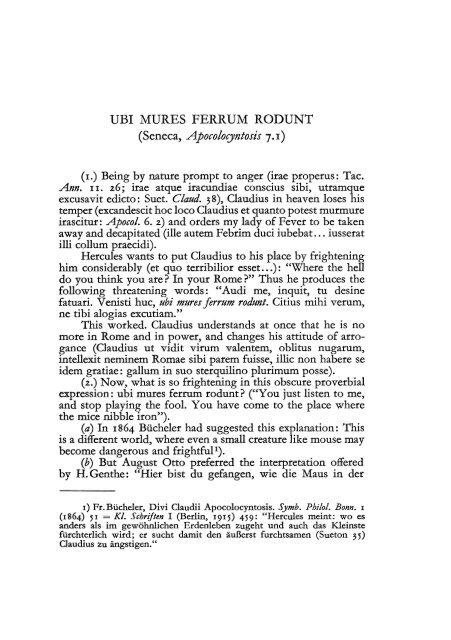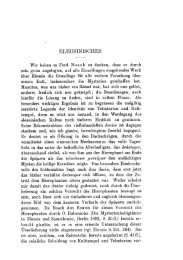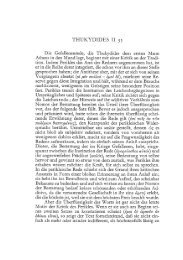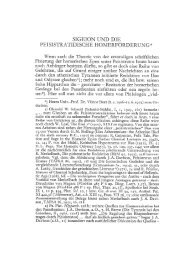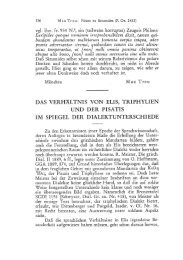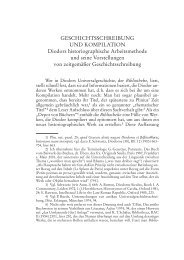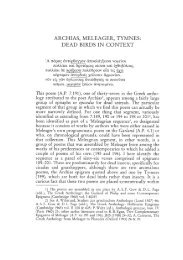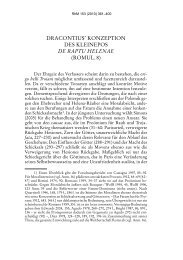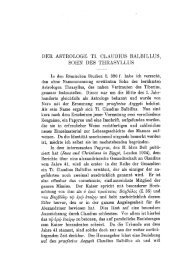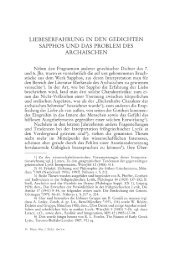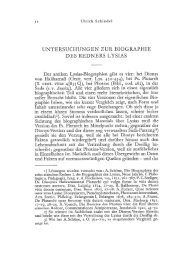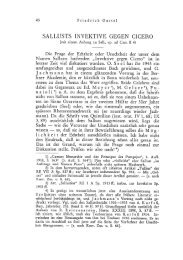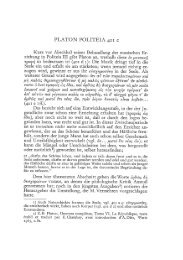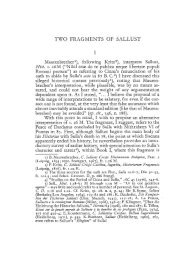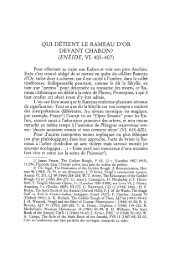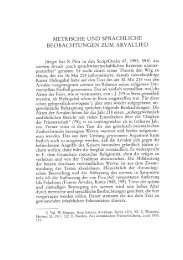UBI MURES FERRUM RODUNT (Seneca, Apocolocyntosis 7.1)
UBI MURES FERRUM RODUNT (Seneca, Apocolocyntosis 7.1)
UBI MURES FERRUM RODUNT (Seneca, Apocolocyntosis 7.1)
You also want an ePaper? Increase the reach of your titles
YUMPU automatically turns print PDFs into web optimized ePapers that Google loves.
<strong>UBI</strong> <strong>MURES</strong> <strong>FERRUM</strong> <strong>RODUNT</strong><br />
(<strong>Seneca</strong>, <strong>Apocolocyntosis</strong> <strong>7.1</strong>)<br />
(1.) Being by nature prompt to anger (irae properus: Tac.<br />
Ann. 11. 2.6; irae atque iraeundiae eonscius sibi, utramque<br />
excusavit edicto: Suet. Claud. ;8), Claudius in heaven loses his<br />
temper (exeandescit hoe loeo Claudius et quaoto potest murmure<br />
irascitur: Apocol. 6.2) and orders my lady of Fever to be taken<br />
away and deeapitated (ille autem Febrim dud iubebat... iusserat<br />
illi collum praecidi).<br />
Hercules waots to put Claudius to his place by frightening<br />
him eonsiderably (et quo terribilior esset...): "Where the hell<br />
do you think you are? In your Rome?" Thus he produces the<br />
following threatening words: "Audi me, inquit, tu desine<br />
famati. Venisti hue, ubi mure! ferrum rodunt. Citius mihi verum,<br />
ne tibi alogias excutiam."<br />
This worked. Claudius understaods at onee that he is uo<br />
more in Rome aod in power, and ehanges his attitude of arrogance<br />
(Claudius ut vidit virum valentem, oblitus nugarum,<br />
intellexit neminem Romae sibi parem fuisse, illic non habere se<br />
idem gratiae: gallum in suo sterquilino plurimum posse).<br />
(2..) Now, what is so frightening in this obscure proverbial<br />
expression: ubi mures ferrum rodunt? ("You just listen to me,<br />
and stop playing the fool. You have come to the plaee where<br />
the mice nibble iron").<br />
(a) In 1864 Büeheler had suggested trus explanation: This<br />
is a different world, where even a small ereature like mouse may<br />
become dangerous aod frightfuI 1 ).<br />
(b) But August Otto preferred the interpretation offered<br />
by H.Genthe: "Hier bist du gefangen, wie die Maus in der<br />
1) Fr.Bücheler, Divi ClaudH <strong>Apocolocyntosis</strong>. Symb. PhilaI. Bann. 1<br />
(1864) 51 KI. Schriftcn I (Berlin, 1915) 459: "Hereules meint: wo es<br />
anders als im gewöhnlichen Erdenleben zugeht und auch das Kleinste<br />
fürchterlich wird; er sucht damit den äußerst furchtsamen (Sueton ;5)<br />
Oaudius Zu ängstigen."
86 Miroslav Marcovich<br />
Falle, hier gibt es keine Ausflucht", though there is no mention<br />
of the mousetrap in the text 2 ).<br />
(c) It was an easy task for Crusius to dismiss Otto's interpretation,<br />
and to come back to Bücheler's suggestion which<br />
implied "a Fairyland of Nowhere, where the things are topsyturvy":<br />
"Das Jenseits wird mit Zügen aus den Märchenutopien<br />
und der 'verkehrten Welt' ausgestattet."3)<br />
(d) Continuing the line of interpretation Bücheler-Cmsius,<br />
Weinreich wrote: "Wo schon ängstliche Mäuse das Eisen<br />
fressen, was für Kerle müssen dann erst Hercules und die anderen<br />
Himmelsbewohner sein!"4) Weinreich espedally stressed<br />
the adynaton-element of such an Utopia.<br />
(e) A new twist to this interpretation was given by Mords<br />
C. Sutphen5), who saw in <strong>Seneca</strong>'s dictum adouble entente. Namely,<br />
in view of the evidence that on the Cycladic island of Gyams<br />
(Yaros, betweenCeos and Tenos) mice nibbled iron 6 ), and also<br />
of the fact that Yaros was used as one of Rome's (and not only<br />
Rome's) political prisons since the times ofTibedus7), Sutphen<br />
suggested that <strong>Seneca</strong>'s intention was to bdng Claudius to the<br />
prison of the other world.<br />
(f) Apparently without being aware of Sutphen's interpretation,<br />
C.F.Russo, in his recent useful edition of the Apocoloryntosis<br />
8 ), advanced the same suggestion: "Questo luogo<br />
terdbile, a quanto pare, era nell' isola di Giaro".<br />
(g) Finally, following a second suggestion offered by<br />
Bücheler 9 ): "ubi nihil est hominum neque humanitatis", W.H.<br />
Alexander lO ) referred to the American expression 'Tough guy<br />
chewed nails' and took the saying to mean: "Claudius... has<br />
come to a rough and tough place".<br />
2) A.Otto, Die Sprichwb'rter der Rbmer (Leipzig, 1890), NQ II68.<br />
3) Otto Crusius, in Wochenschr. f. kl. Philol. 8 (1891) 432 = Nachträge<br />
Zu A. OUo) Sprichwb'rter etc., ed. R.Häussler (Hildesheim, Olms, 1968)<br />
13, and also in his Untersuchungen Zu den Mimiamben des Herondas (Leipzig,<br />
1892) 72-74 (ad Herodas 3.74-76).<br />
4) Otto Weinreich, <strong>Seneca</strong>s <strong>Apocolocyntosis</strong>. Einführung, Analyse u.<br />
Untersuchungen, übersetzung (Berlin, 1923) 74 n. I; 75.<br />
5) 'A Further Collection of Latin Proverbs', Amer.Journ. Phi/ol. 22<br />
(1901) 251 = Häussler (cf. n. 3) 190.<br />
6) Antigonus Mirab. 18; Aelian N.A. 5.15; Pliny N.H. 8.222.<br />
7) Tac. Ann. 3.68; 4. 30; Juvenal 1. 73; Plutarch De exi/io 8 (602 C).<br />
8) L.Annaei <strong>Seneca</strong>e <strong>Apocolocyntosis</strong>. Ed. C.F.Russo, Florence (La<br />
Nuova Italia), 2nd ed., 1955, p. 74.<br />
9) In his edition of Herodas (1892), ad 3.74-76.<br />
10) Class. Philology 30 (1935) 351.
Ubi mures ferrum rodunt<br />
(d) Maybe we can now better understand why mice (a<br />
Seelentier by preference20) can predict war by gnawing metal:<br />
Ante vero Marsicum bellum quod clipeos Lanuvii, ut a te<br />
dictum est (1. 99), mures rosissent, maximum id portenturn<br />
haruspices esse dixerunt (Cie. De div. 2. 59; Pliny N.H. 8.221;<br />
Livy 30. 2. 10). Possibly, mice gnawing the silver-shields at<br />
Lanuvium was considered by the soothsayers as the most<br />
ominous sign of an simply because they assoeiated war with<br />
famine, situation in which mice would attack objects of meta!.<br />
(6.) Back to <strong>Seneca</strong>'s dictum. Desine fatuari: venisti huc,<br />
ubi mures ferrum rodunt. In view of the fact that the phenomenon<br />
of mice gnawing iron usually implies famine and<br />
starvation, I would advanee the following interpretation: "Stop<br />
joking. This is a serious situation for you. This is no more<br />
Rome: you will get nothing to eat here." I think <strong>Seneca</strong> hints at<br />
Claudius' notorious gluttony: Cibi vinique quocumque et<br />
tempore et loeo appetentissimus. . . nec temere umquam<br />
triclinio abseessit nisi distentus ae madens ... Convivia agitavit<br />
et ampla et assidua (Sueton. Claud. 33; 32).<br />
This suggestion is supported by the fact that <strong>Seneca</strong> makes<br />
another allusion to Claudius' voracity at Apocol. 9. 5. In the<br />
senate of the gods Diespiter proposes that Claudius be given<br />
the status of god, since "it is for the public good that there be<br />
some one able to join Romulus in devouring boiled turnips"<br />
(cum. .. sitque e re publiea esse aliquem qui cum Romulo<br />
possit 'ferventia rapa vorare', censeo uti divus Claudius ex hac<br />
die deus sit).<br />
(7.) Possibly, <strong>Seneca</strong>'s image of a heaven with no food for<br />
the souls of the dead was inspired by the Stoic esehatological<br />
idea about the souls of the dead being nourished only from<br />
exhalations that reach them in the ethereal regions about the<br />
moon: -Und iiff; iVXOVO'f}f; ava()vp,{a0'8wf; -r:(!ÜpM()at (Plutarch De<br />
fade 943 E); animus... aletur et sustentabitur iisdem rebus,<br />
quibus astra sustentantur et aluntur (Cic. Tusc. 1. 43); i(!Orpfj i8<br />
X(!WViat olxetq. ifj ilnd riff; ava()vp,Ulmt, Wf; xat ia A,Oma (J.O'i(!a<br />
(Sext. Emp. Adv. math. 9.73)21).<br />
Urbana Miroslav Marcovieh<br />
zo) Cf., e.g., Steier, in PW RE, s.v. Maus, 14 (1930) Z406f.; Otto<br />
Keller, Die antike Tierwelt (Leipzig, 1909), I, 196.<br />
ZI) Cf. H.Chemiss ad Plut. De facie 943 E (Loeb, Plutarch, Moralia,<br />
XII, 1968), p. z03 n. e.<br />
Korrekturzusatz. On (5.) (c) cf. also E. Wendling, Phi/ol. 5I (189Z) 180, and<br />
I. C. Cunningham, Herodas Mimiambi (Oxford, 197I) IZZ.


